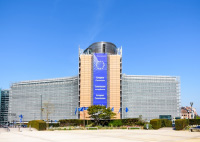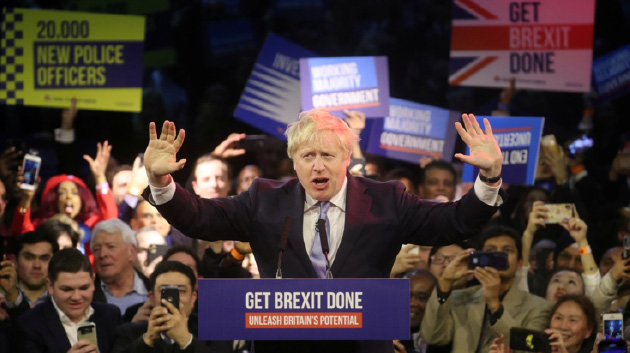Will Brexit Open Doors for Japan-U.S.-U.K. to Lead Golden Age?
P.M. Johnson spoke at a campaign event in the city of London on Dec. 11, one day before the general election. Amidst public criticisms, his ability remains strong. (photo: reuters/ Aflo)
Britain’s departure from the European Union (Brexit) is just around the corner.
The media often portray Brexit in a pessimistic light, but Brexit will be in Japan’s national interest.
On Dec. 12, 2019, Prime Minister Boris Johnson’s Conservatives won the United Kingdom general election, paving the way for Brexit.
The Conservatives won a majority of parliamentary seats, and aim to smoothly pass October’s withdrawal agreement with the E.U. through Parliament and complete
Brexit by the end of January 2020.
Going onwards, Britain plans to negotiate free trade agreements (FTA) to form new relations with the E.U. Some argue that Brexit will weaken the U.K.’s economy.
What Kind of Man Is P.M. Johnson?
Mr. Johnson who leads Brexit is described as “Donald Trump with a slightly better hairstyle”, and is infamous for his racist comments that aroused public controversy.
He ridiculed Muslim women wearing burqas by comparing them to letterboxes and made a sarcastic comment on former U.S. President Obama: “Some said it was a symbol of the part-Kenyan president’s ancestral dislike of the British empire.”
On the other hand, he has made various accomplishments as a practitioner.
As a London mayor in 2008, Mr. Johnson contributed to loosening regulations and proactively attracted foreign businesses. He promoted a vocational education system and provided employment support for citizens. Once he took office in 2019, he demonstrated high negotiation skills and took care of disorderly withdrawal agreements with the E.U.
British People’s True Confessions

A demonstration in favor of Brexit took place in the city of London in March 2019. (photo: reuters/ Aflo)

The headquarters of the main E.U. institutions are located in Brussels, Belgium. There employ over 30,000 staff.(photo: olrat / Shutterstock.com)
Why did the British people choose Brexit in the first place?
There are two major reasons — the first reason is the existence of the E.U.’s absurd laws: “Bent cucumbers can’t be sold,” (abolished in 2009) “halogen lightbulbs are banned from sale in favor of LEDs” and “E.U. nationals working in the U.K. can claim child benefits from the British government even if the child isn’t living in the U.K.”
These regulations are set by the European Commission. British people became increasingly discontent of the elites who lack the perspectives of ordinary people despite creating regulations.
The second reason is regarding immigration and refugee issues.
After 2000, immigrants from countries such as Poland and Romania suddenly moved to the U.K. When radical Islamic movements spread in the Middle East, many refugees poured in from Syria and Iraq.
An influx of cheap labor worsened public order within the U.K. and caused a wage cut. The anger of citizens built up to support Brexit.
Employment Increased Once Brexit Confirmed
Many voices argue that despite the E.U. being inefficient, Brexit will create tense relations with E.U. nations and many businesses based in the U.K. will move to a foreign location.
However, this perspective underestimates the U.K.’s economy.
“It was predicted that domestic employment in the U.K. will decline by 500,000 positions if the pro-Brexit side won the 2016 national vote,” said Anthony Kim of the Heritage Foundation, an influential American conservative think tank. “In reality over the past few years, employment has increased by 800,000 people. The U.K.’s domestic market is large and the economic foundation is extremely stable. If you read basic statistics, you will see that Brexit won’t cause any damages.”

Anthony Kim is a research manager of the Heritage Foundation.
A Stable U.K. Economy
One of the U.K.’s strengths is the flexibility of corporate activity.
Their corporate tax is 19%, about 30% lower than Japan’s, and the regulations toward businesses are very loose. The Heritage Foundation ranked the U.K. as seventh in its index of economic freedom.
If the U.K. leaves the E.U., they will be able to have free business relationships with other countries with their own power.
Furthermore, the U.K.’s strength as a “financial nation” shouldn’t be disregarded.
Within the center of London, there is an area known as “City of London” where over 500 financial organizations from all over the world have a base set up. In this area, currencies such as the dollar are exchanged to the tune of about $2.5 trillion (approximately 270 trillion yen) per day and has risen as the world’s largest market.
The reason for this high rate of foreign exchange, in addition to its high economic freedom, is the fact that they are located in between Asia and America, allowing them to exchange when it is evening in the Asian market and morning in the New York market. In addition, the standard language in the financial business is their native language of English and they have a tax haven in a nearby island.
By leaving the E.U., money will increasingly gather to the U.K. and the country will go through economic growth.
Connecting Globally rather than the E.U.
So, in thinking about the future that P.M. Johnson imagines after Brexit, the “Global Britain” plan can’t be left out.
In this plan, Britain doesn’t simply remain as a country filled with confidence and freedom in the European continent alone, but rather seeks economic and diplomatic opportunities across the globe.
More specifically, this includes building a huge economic sphere with the previous colonies of British Empire that continue to have strong relationships with the U.K. — “the British Commonwealth.” (Top) Countries affiliated include Canada, Australia, India, Singapore and South America, a rattling number of 53 nations (2.4 billion people). The U.K. is the confederacy leader of an organization much larger than the E.U.
The U.K. has an ambitious vision of forming an FTA with the countries of the British Commonwealth and lining up with the U.S. and China.
This endeavor has already begun. In 2018, they held a head conference with member states in London. Prime Minister Modi from India, Prime Minister Trudeau from Canada, Prime Minister Turnbull from Australia and over 49 heads of countries such as Singapore and South Africa gathered, reaching a consensus on topics such as the increase of export subsidies for the British Commonwealth, cyber security measures and defense cooperation.
Will they Rise Once More as the “Mistress of the Sea?”
The “Global Britain” plan also symbolizes the British navy’s advance into Asia.
Mr. Johnson who served as Foreign Minister in 2018 has declared that two ships, HMS Queen Elizabeth and HMS Prince of Wales will be dispatched to the South China Sea.
The proof for this dispatch is the Five Power Defense Arrangements tying 5 countries of the British Commonwealth: U.K., Malaysia, Singapore, Australia, and New Zealand. As can be seen from the map in the previous page, the five countries have common interests regarding the conflict in South China Sea.
If the U.K. revives the Commonwealth and rebrand themselves as the “Mistress of the Sea” that dominated the seven seas, their power may be enough to counter China.
Japan should also partner with the U.K. to strengthen the Chinese encirclement. Japan and the U.K. are already collaborating to develop missiles. If the U.S. joins, the encirclement will be much stronger.
Will Japan-U.S.-U.K. Turn the World?
U.S. President Donald Trump is pro-Brexit, and he has communicated with pro-Brexit U.K. politicians multiple times.
Happy Science CEO Master Ryuho Okawa conducted a spiritual reading with economic commentator Keitaro Hasegawa in November 2019 regarding President Trump’s aim.
“(President Trump) will crush the E.U. That’s why he is trying hard to urge the U.K. to break off and form a tag with the U.S. I think he’s thinking about turning the world along with the U.K. and Japan.”
Mr. Kim also said that the “U.K., U.S. and Japan share similar values of a free market, democracy and freedom. Brexit will allow for a golden triangle to form between the three countries.”
Meanwhile, P.M. Johnson previously made a statement that “the U.K. wholeheartedly welcomes Chinese capital.” There still remains possibility of the U.K. choosing China as a new business partner to take the E.U.’s place.
In order to use Brexit to create a Chinese encirclement between Japan, the U.S. and the U.K., the U.S. and Japan must push forth the universal values of “freedom, faith and democracy” to pull in the U.K.
Commentary
Public Order Up Until Now
E.U. on the Decline
- Strict regulations and immigration issues cause a rapid decline of the E.U.
↓
Renewed Public Order
A New Age for Japan-U.S.-U.K.
- The U.K. will leave the E.U. to create an enormous economic zone within the Commonwealth
- Japan will partner with the U.K. and counter China over territory disputes in the South China Sea
- Japan-U.S.-U.K. will cooperate and prosper alongside each other to open a Golden Age



















